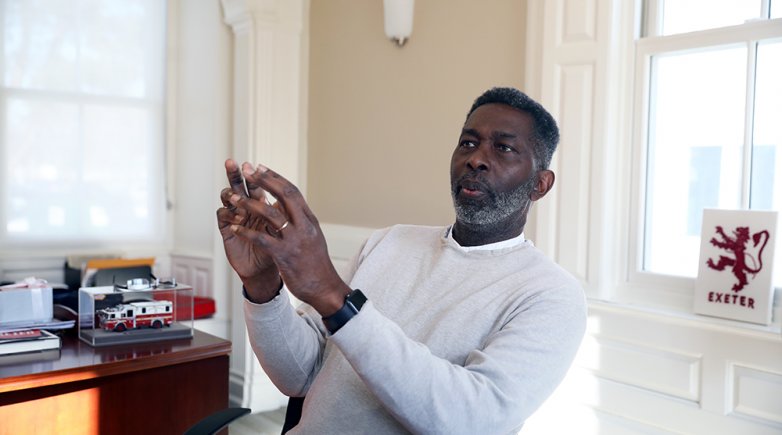This Exeter Summer was unlike any other
Remote learning caused challenges and created opportunities for the time-honored program.
On a bench outside of the quiet Exeter Summer offices on Main Street, Russell Weatherspoon reflects on his experience planning the 2020 program.
“It felt like a ring,” he says. “A ring that has no beginning and no end. Every question that one wants to have answered seems to be related to another answer, which is by definition unavailable. It was constant chasing.”
For the first time in Exeter Summer’s 102-year history, all learning took place completely online as a result of circumstances surrounding the global pandemic.
“There were obviously limitations and challenges,” says Weatherspoon, who has been involved with Exeter Summer since 1988 and was named director in 2019. “But one of the purposes of education and having all of these students together is so you can share ideas. It’s part of what kids come to Exeter for.”
Designed for discourse
Top of Weatherspoon’s mind was how to adapt the program to ensure it continued to foster the hallmark sense of community and conversation that is so transformative during a regular, in-person session and remain relevant to students perhaps already fatigued with remote learning. It was a “balance of concerns,” Weatherspoon says. “What should be offered and how much community could be preserved?”
His first step: lay the groundwork for every Exeter experience — open discourse and empathy. “You are in a space with people who have very different cultures and histories, sometimes they speak different languages,” he tells the hundreds of students hailing from 23 different countries during their first all-school Zoom meeting. “You need to remember that the people you see on this screen now and in the next five weeks are real people, they are not stand-ins or two-dimensional, so let’s treat each other with kindness and respect, because perhaps someday we will be actually physically present to one another.”
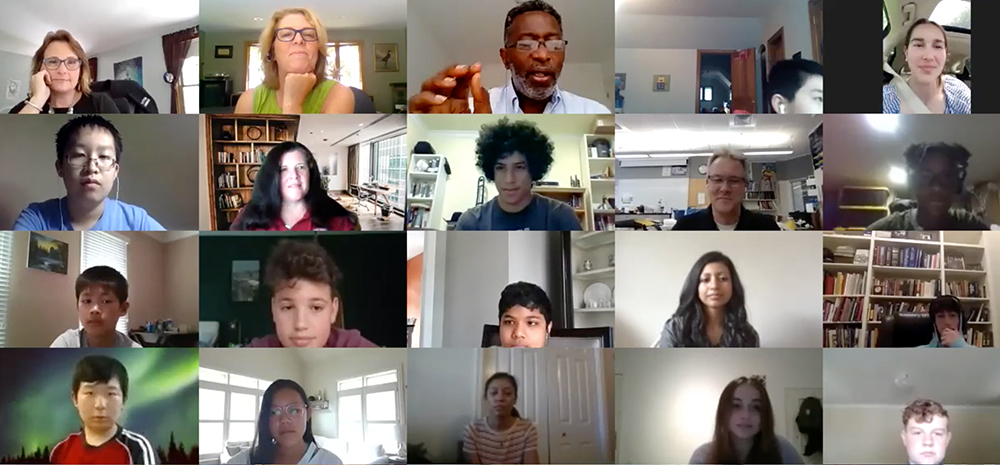
To inject more community touchpoints and offer an experience unlike others readily available online, Weatherspoon and his team scaled back the number of days a week the students attended synchronous class to four and focused their attention on developing a robust assembly speaker series that would act as a vibrant forum for the exchange of ideas. “Assembly is a very important part of the ethos of this school,” he says. “It provides an opportunity for the whole community to have something to talk about in common, which only assists with coherence.”
Big topics to tackle
But what to talk about during these hour-long blocks on Wednesdays? What could help bring the whole community together? “COVID-19 is a global experience, it’s a common experience for everyone and obviously it was the reason why we we’re having an online program, so I felt we should address it in some upfront way,” Weatherspoon says. “And then after weeks and weeks of dealing with [the pandemic] along comes the killing of George Floyd, which was just this thunderbolt. That was so large. So global.”
To delve into these topics, Weatherspoon interviewed each speaker rather than asking them to make a presentation. He also included an interactive chat to field students' questions. “It seemed to me that it would be helpful for the students to be able to not only hear from someone present, but also to be able to ask questions.” For those students who weren’t easily available during the scheduled assembly timeslots, Weatherspoon made recordings of the sessions available for later viewing.
“The assemblies give the kids just a remarkable set of things to think about,” he says. “Things that are accessible, human and hopefully encouraging. … We’re not trying to solve the pandemic or the lack of racial consciousness, we’re just trying to move people’s heads and the conversation along.”
Alumni share their stories
Weatherspoon invited four alumni to share their stories with Exeter Summer students and help illuminate the effects of the pandemic and racial injustice.
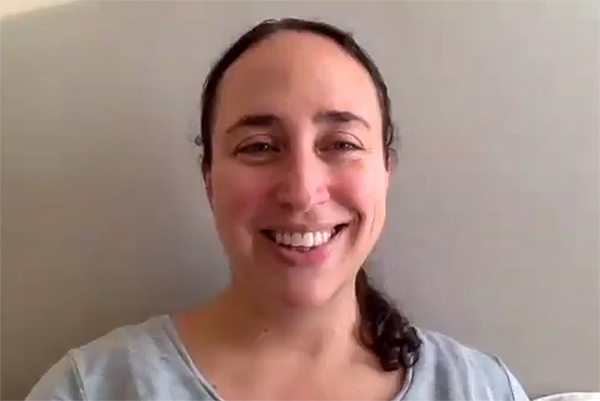 Dr. Julia Sobol ’94 opened the series by speaking candidly about her first-hand experience on the frontlines as an anesthesiologist at New York Presbyterian Hospital. “She’s a medical professional, but she’s also a spouse who’s also a mother and she, like everybody else involved in the medical profession, had to start thinking ethically and practically,” Weatherspoon says. “We wanted to give students an opportunity to talk with someone who was part of this historic moment in the country.”
Dr. Julia Sobol ’94 opened the series by speaking candidly about her first-hand experience on the frontlines as an anesthesiologist at New York Presbyterian Hospital. “She’s a medical professional, but she’s also a spouse who’s also a mother and she, like everybody else involved in the medical profession, had to start thinking ethically and practically,” Weatherspoon says. “We wanted to give students an opportunity to talk with someone who was part of this historic moment in the country.”
In response to student questions, Sobol shared that “the emotional conflict and tension between caring for patients and protecting my family was one of the toughest things to deal with. … At times I felt as if I was being asked to go to war without any ammunition or protective, bullet-proof vest or anything like that.”
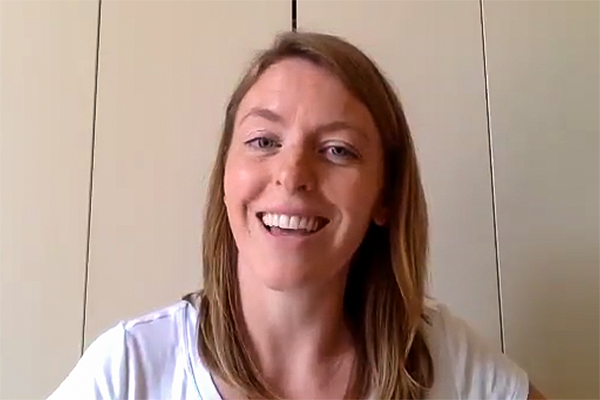 A week later, Christina Murdock ’05, an award-winning playwright, actor and opera singer, performed “My White Privilege,” a monologue she penned with thought-provoking lines like: “My white privilege tells me I am not a racist. I am not the problem. How can I be? I’m a white woman. A feminist.”
A week later, Christina Murdock ’05, an award-winning playwright, actor and opera singer, performed “My White Privilege,” a monologue she penned with thought-provoking lines like: “My white privilege tells me I am not a racist. I am not the problem. How can I be? I’m a white woman. A feminist.”
At the end of Murdock’s performance, Weatherspoon asked the students to do something “unusual.” “Let me invite you for 90 seconds for a little bit of conversation with yourself through note-taking whether you do that on an actual piece of paper, or you are just thinking,” he said. “To engage yourself not so much in response to the voice in this piece, but rather to the voice in your own life, which has been talking to you now for some weeks since George Floyd died, and the world responded as it has. Each of us has been trying to understand where we stand. We’ve certainly had a lot to say about other people, but I want you to take 90 seconds to just make some notes to yourself, with yourself, about where you are, whoever you are.”
Julio Peterson ’86 spoke not only about his pathway from student to vice president of real estate for The Shubert Organization, but also about his social justice efforts. “I’ve been very confrontational about the fact that the Broadway industry is very limited to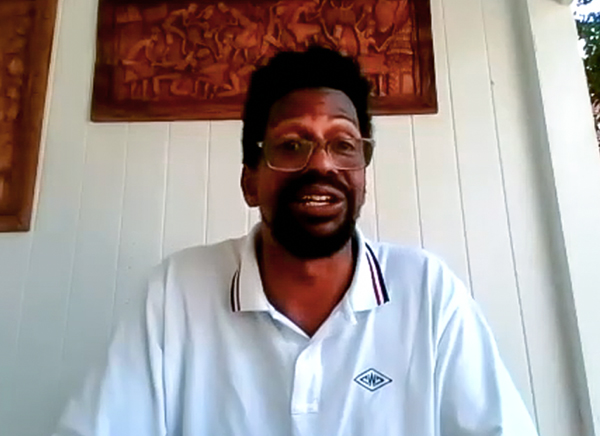 people of color,” he told the students. “To get people of color, not just to be on the stage, because we’ve been on the stage for a long time, and although there were periods of time when Black people could not be on the stage and white performers were performing blackface, but also we’re not represented in all other employment opportunities that make theater happen, whether it be set design, lighting design, general management or legal.”
people of color,” he told the students. “To get people of color, not just to be on the stage, because we’ve been on the stage for a long time, and although there were periods of time when Black people could not be on the stage and white performers were performing blackface, but also we’re not represented in all other employment opportunities that make theater happen, whether it be set design, lighting design, general management or legal.”
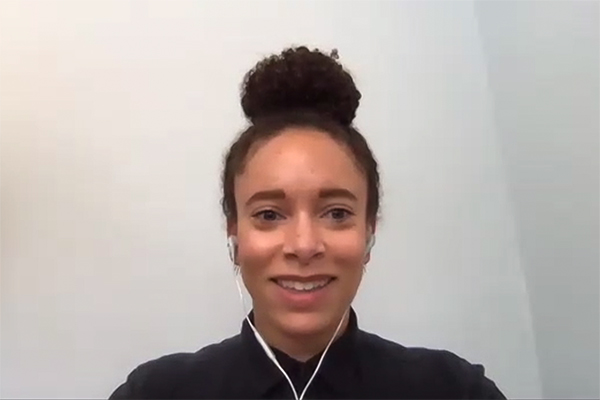 And Meredith Hitchcock ’06, a user experience researcher currently focused on inclusion, accessibility and equity at Airbnb, closed out the series telling students about her work developing technology for social justice. Hitchcock described in detail RideAlong, the mobile app she helped create for first responders, as well as her efforts in criminal justice to reform the bail system. “The lever I’m always looking for in technology is, is there a way that technology cannot just be a band-aid for something but change what feels possible.”
And Meredith Hitchcock ’06, a user experience researcher currently focused on inclusion, accessibility and equity at Airbnb, closed out the series telling students about her work developing technology for social justice. Hitchcock described in detail RideAlong, the mobile app she helped create for first responders, as well as her efforts in criminal justice to reform the bail system. “The lever I’m always looking for in technology is, is there a way that technology cannot just be a band-aid for something but change what feels possible.”
